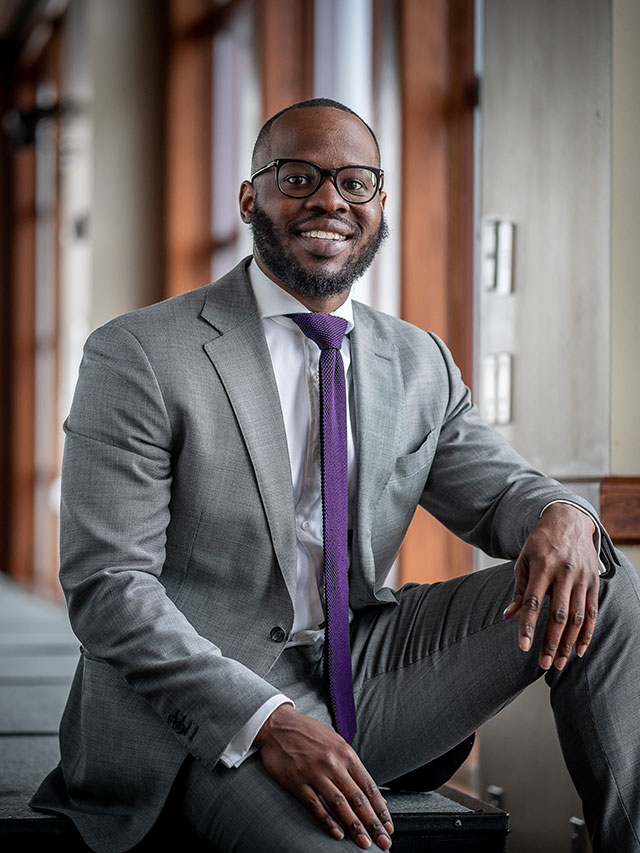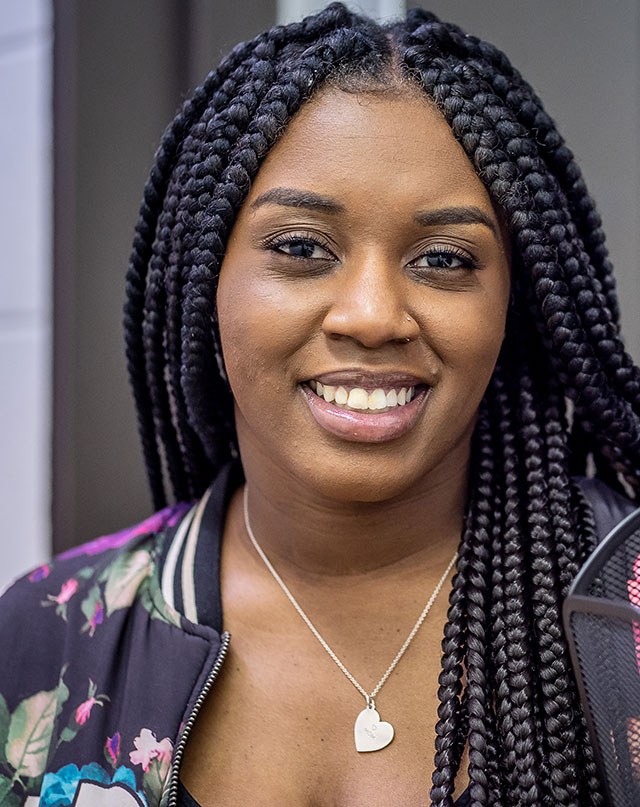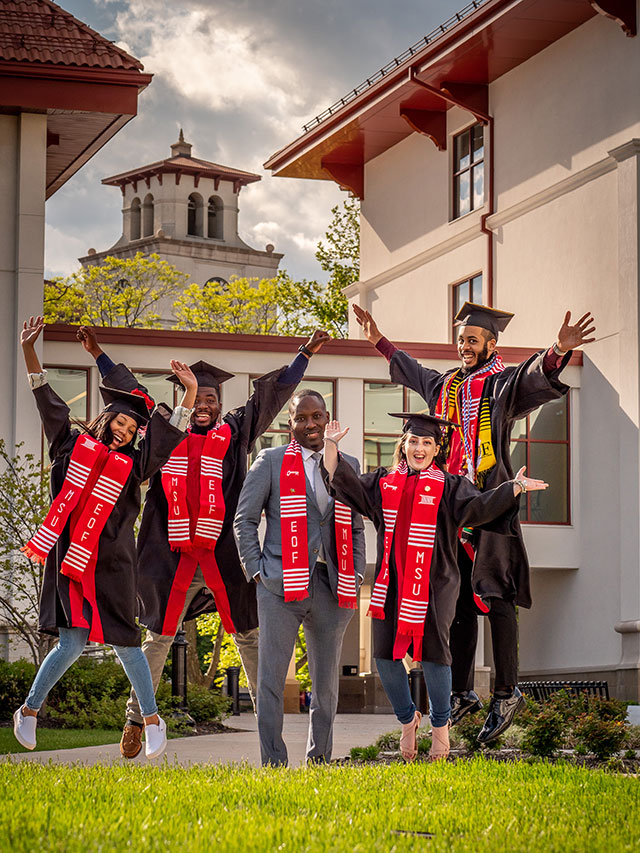
ABridgetoSuccess
EOF changemakers celebrate 50 years of transforming lives
Growing up in Camden, a city synonymous with urban blight, the classroom for Jherel Saunders-Dittimus was a bright spot. “I always loved school,” he says. “As much as I probably complained in order to fit in, school was always my gateway. I felt like school was definitely the place where your dreams could come true.”
As an Educational Opportunity Fund (EOF) scholar at Montclair State University, Saunders-Dittimus is chasing those dreams. He’s a leader on campus, and after running this spring, new president of the Student Government Association. His resilience and experiences drive him to succeed.
“Camden does have its bad times, it does have its crimes, but that does not define the city and it does not define me as a person,” he says. “At the end of the day, that’s where I gained my heart.”
For the past 50 years, EOF has discovered the potential in students like Saunders-Dittimus, providing a way for young men and women from the poorest neighborhoods, from the most troubled school districts, to thrive when given a real chance with quality mentoring, tutoring and advising.
Montclair State’s EOF has long been a shining example of the 65 state-funded EOF programs in New Jersey, each designed to provide support for educationally and economically disadvantaged students, many the first in their families to attend college. And often, as is the case at Montclair State, it is run by people who have walked in those students’ shoes.
Breaking Down Barriers
Kaluba Chipepo, a sergeant on the University police department and an adjunct professor, shares his story with EOF scholars new to the program: the middle of 11 children raised by a single mother who encouraged him to continue school. “She wanted me to set a different path for my younger sisters who were coming up,” he says.

EOF alumnus
Accepted by EOF at Montclair State, he set off in the summer of 1988, “throwing a few things into a garbage bag. My mom gave me money for the bus and I was off to college.”
All new scholars take part in a summer academy known as the “heart and soul” of EOF, a six-week program that introduces college courses and provides the new students with the structure, skills, resources and counseling that significantly reduce drop-out rates, contributing to keeping nearly 90 percent of the first-year scholars in school.
“We put our students through the rigor. We really do,” says Rahjaun Gordon, associate director. “But we do it out of love. We do it out of community. We do it out of character building, and we fill in any gaps that the students may have had in their educational, personal journeys.”
Retention and graduation rates are the key measures of the program’s success, and at Montclair State, three out of four scholars graduate within six years, among the highest in the state.

Associate director
Chipepo credits EOF for helping him persevere through life challenges that could have easily derailed him from completing his bachelor’s degree in business administration, and later an MBA. “When you go into EOF, you go in with half a tank. They fill you up with a full tank of gas and you’re ready to face the world again,” he says.
“We try to navigate some of the stressors and troubles our EOF students had coming to college by giving them as much support as possible, by being mentors, by being motivators and also by showing them that it is possible,” says Gordon, a doctoral student conducting research on first-generation, low-income African American males and their persistence in college. He studies the students’ family structures as well as the factors that supported them on their way to college and while they’re in school.
Home Away From Home
Cierra Watts is capitalizing on the opportunities. Graduating in the top of her class at University High School in Newark, she was accepted into 21 colleges. She chose Montclair State because of the promise of EOF. “No matter what kind of student you are in high school, the transition to college is going to be totally different. You’re more independent; you’re living alone. There’s no one to wake you up in the morning and no one to tell you to do your homework. I wanted stability. I had heard great things and that great people come from EOF.”

EOF alumni include political commentators, college administrators, actors and business leaders, and Watts has her sights set high. A business administration major who graduated in four years in May with a concentration in Finance, she served as a student representative on the University’s Board of Trustees. She plans to help build wealth for lower-income investors. “EOF has played a big part in my growth as a student leader and in the ways I am paving pathways for students coming behind me.”
Her own path has not been easy. In September, on the first day of her senior year, her mother, Myeshia Williams, died unexpectedly. “When I started college, my mom went back to school. She said, ‘I can’t push you to go to college if I don’t finish.’ And she actually finished. She finished her last class a week before she passed away. I’m proud I was able to inspire her to finish her degree.”
“When they say EOF is family, they really mean it. It’s a family because they have background and understanding of everything you’ve been through.”
At the funeral, Watts says she was uplifted by her EOF family. “When they say EOF is family, they really mean it. They have background and understanding of everything you’ve been through. EOF is one of those places where I can go. I can laugh. I can cry. I can feel at home. It’s like a home away from home.”
Saunders-Dittimus takes the family analogy a step further. “I always say that EOF equals FOE and FOE stands for Family Over Everything.”
Personal and Professional
“My story is unique, but the stories I hear from my scholars are very similar,” says EOF Executive Director Daniel Jean, who lost his father in the eighth grade. “I was a straight-A student up until that point, and then my grades started to plummet. An EOF director interviewed me, told me that my grades were terrible – the interaction was very strange; I didn’t know what his angle was. Then two weeks later I received an acceptance letter. I was forever grateful.
Raised by Haitian immigrants in the heart of Newark, New Jersey, this avenue for college access absolutely made the difference.”

Recently, Jean was in the computer lab, talking with a student typing a paper. “Dr. Jean, my mother lost her home again so we’ll have to go back to the shelter.” The student remained composed, going right back to typing his paper after sharing the news, Jean recalls. “There are a lot of scholars dealing with similar situations of the despair and the challenges that come with poverty. What we do is engage these motivated scholars and provide them resources and encouragement to ultimately achieve their personal and professional dreams.”
The legacy of EOF is important, Jean says. “When I started here, there was a strong foundation and framework,” much of it credited to the contributions of Bertha Diggs. She was part of the inaugural class in 1968 of Martin Luther King Scholars (later to be renamed the Educational Opportunity Fund), and made EOF her life calling, retiring last year after three decades as a champion of Montclair State students.
Inspiring New Leaders
Saunders-Dittimus, who has worked the past two summers as a peer leader, shares with new EOF students the highs of the college experience and his personal lows struggling academically. “I nearly packed my bags,” he says. “My advisors just saw something in me and wouldn’t let me go.”
These days, Saunders-Dittimus is a rising senior in communication studies with a minor in entrepreneurship. He plans to earn higher degrees and return eventually to Camden to create youth programs. “I want to be the person who drives the younger generation to go to school or get on a career path,” he says. “I’ve learned that our days are ticking, that we have just so much time in the world, and the time we have should be focused on investing in ourselves.”
“When you go into EOF, you go in with half a tank. They fill you up with a full tank of gas and you’re ready to face the world again.”
Some 700 students are EOF scholars at Montclair State. To be eligible, participants must have resided in New Jersey for at least 12 months, meet the NJ State Higher Education income criteria and exhibit through academic standing the potential for high achievement.
Eligible students receive up to $1,500 of EOF Grant funding annually, awarded in the state system by Gladys Valentin, assistant to the executive director. She’s another of the EOF alumni on campus, joining EOF as a secretary in 2001 and taking advantage of the opportunity to earn a degree as an EOF transfer student graduating with a bachelor’s degree in Spanish. She received the Excelsior Award for outstanding service and dedication. As a single mother, she understands the challenges the scholars face and gives back by donating each year to the EOF book fund. “Students do come here struggling. I just like to help,” she says.

EOF alumna
Many students worry their financial needs and grades will hinder their possibilities, says Mary Colon, director of academic personnel services. She also understands the roadblocks. Colon was a high school student at Barringer in Newark – one of 10 children and the first to head to college – when she was accepted to Montclair State as an EOF scholar. “EOF nurtures you to have a voice in navigating your financial and academic path,” she says.
Each year, EOF brings more than 1,000 high school students to campus during the Young Women’s Leadership and Boys to Men conferences that showcase the college experience and provide financial literacy, leadership and career training. The students also receive help throughout the college application process, including financial aid and scholarships.
“EOF is still one of the best kept secrets in New Jersey,” Jean says. “There are pockets throughout the state that don’t know what EOF is so I’m working very intently to make sure that EOF is known, and that the folks who need to know know so that students are continuously supported for the next 50 years.”